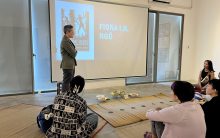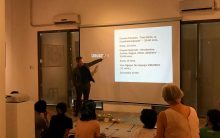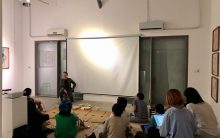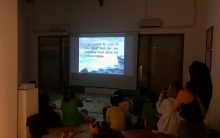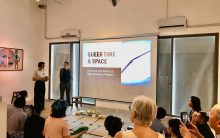Queer Time and Space: Reading Group with Fiona Ngo
Date & Time: Tues, 14 Mar @4:00PM-7:00PM
Location: Sàn Art
Millenium Masteri,
Units B.16 & B.17
132 Ben Van Don, Ward 6, District 4,
Ho Chi Minh City, Vietnam
Language: English
We were so honoured to host Fiona Ngô at Sàn Art, who led a rich discussion of Gayatri Gopinath’s Unruly Visions, Elizabeth Freeman’s Time Binds, and Nguyen Tan Hoang’s short video PIRATED! (2000), guiding participants through conceptualizations of time, space, archives, and region, and how they are linked to trauma, desire, imperialism, and transnational capital.
————
About Unruly Visions
Gayatri Gopinath brings queer studies to bear on investigations of diaspora and visuality, tracing the interrelation of affect, archive, region, and aesthetics through an examination of a wide range of contemporary queer visual culture. Spanning film, fine art, poetry, and photography, these cultural forms—which Gopinath conceptualizes as aesthetic practices of queer diaspora—reveal the intimacies of seemingly disparate histories of (post)colonial dwelling and displacement and are a product of diasporic trajectories. Countering standard formulations of diaspora that inevitably foreground the nation-state, as well as familiar formulations of queerness that ignore regional gender and sexual formations, she stages unexpected encounters between works by South Asian, Middle Eastern, African, Australian, and Latinx artists such as Tracey Moffatt, Akram Zaatari, and Allan deSouza. Gopinath shows how their art functions as regional queer archives that express alternative understandings of time, space, and relationality. The queer optics produced by these visual practices creates South-to-South, region-to-region, and diaspora-to-region cartographies that profoundly challenge disciplinary and area studies rubrics. Gopinath thereby provides new critical perspectives on settler colonialism, empire, military occupation, racialization, and diasporic dislocation as they indelibly mark both bodies and landscapes.
————
About Time Binds
Time Binds is a powerful argument that temporal and sexual dissonance are intertwined and that the writing of history can be both embodied and erotic. Challenging queer theory’s recent emphasis on loss and trauma, Elizabeth Freeman foregrounds bodily pleasure in the experience and representation of time as she interprets an eclectic archive of queer literature, film, video, and art. She examines work by visual artists who emerged in a commodified, “postfeminist,” and “postgay” world. Yet they do not fully accept the dissipation of political and critical power implied by the idea that various political and social battles have been won and are now consigned to the past. By privileging temporal gaps and narrative detours in their work, these artists suggest ways of putting the past into meaningful, transformative relations with the present. Such “queer asynchronies” provide opportunities for rethinking historical consciousness in erotic terms, thereby countering the methods of traditional and Marxist historiography. Central to Freeman’s argument are the concepts of chrononormativity, the use of time to organize individual human bodies toward maximum productivity; temporal drag, the visceral pull of the past on the supposedly revolutionary present; and erotohistoriography, the conscious use of the body as a channel for and means of understanding the past. Time Binds emphasizes the critique of temporality and history as crucial to queer politics.


